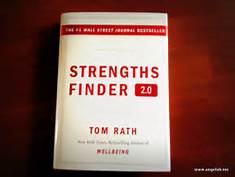
I have spent most of my recent posts on playing defense (expense management) but have decided to switch gears and go back on offense today. Let’s talk about some career management.
Most millionaires chose wisely in their occupation – by choosing something they enjoyed and were good at. Those 2 things are probably related – you probably don’t enjoy doing something you aren’t that good at. I know you probably think I reference too many books, but I am going to strongly encourage you to get one more – but this isn’t a normal book and you only need to read 2 or 3 chapters (say what? (Ron Burgandy voice). The book is called strengths finder 2.0
It’s an unusual book because you start by taking on an online survey about your preferences/personality and that survey measures your work-related strengths.

“Do you have the opportunity to do what you do best every day? Chances are, you don’t. All too often, our natural talents go untapped. From the cradle to the cubicle, we devote more time to fixing our shortcomings than to developing our strengths.”
Think of it this way – if Cam Newton discovered that he is a terrible tennis player (he probably isn’t, but hey, work with me), should he spend a bunch of time trying to improve this shortcoming? Or would he be better off focusing on improving his extraordinary QB skills? The answer is so easy even captain oblivious would get this one right. The same thought process applies to your career and job choices.
Many surveys indicate that an overwhelming majority (between 70 and 80%) of Americans hate/dislike their jobs. Don’t complain about it – do something about it!
Take the strengths finder survey and figure out your top 5 strengths and which occupations best fit you. My top strength is that I’m analytical, which fits really well in my chosen field of accounting. I’m an oddball because I really like my job (most days anyhow). I’m fortunate because I am working in a field well-suited to my personal makeup.
It’s more than just choosing the right occupation though. Let me summarize my next 5 career tips.
- Take the strengths finder survey and figure out what your good at (see above if you skipped that part).
2. Research the industry and the company before you ever interview for a prospective job. Don’t go in uninformed.
- Ask candid questions of existing employees (if you can).
- Ask questions about the management style of your immediate supervisor. You will be unhappy if you expect freedom from your manager and instead work for a micro-manager.
- Know your worth – there are lots of ways to research online: payscale.com, salary.com, glassdoor.com. I confess I am not familiar with all of them, but hopefully it can help you establish a range of what your salary should be based on your skills, experience, field, location, etc. The internet is an amazing resource – don’t waste it. The best time to negotiate your salary is before you accept the position. Go online and look for industry forums. Read industry salary guides. Do your homework and know what you are worth. Knowledge is power.
see below my original post on career advice

Recent Comments